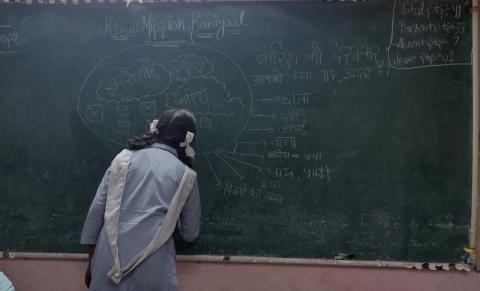
Budgetary allocation and the future of Education
A budget is an idea where reality meets expectations. The difference between the two tells what we prioritise and what we don't. The union budget continues to disappoint. It was expected that there will be a sink between education policy and economic policy. Unfortunately, the gap continues. Education remains the victim of rhetoric. Several educational commissions and policies have been arguing for a larger share for education from the Union Budget. However, Politics has always found it more comfortable to allocate the budget of words to education than money. The result is the sulking educational infrastructure across the country. There is a light at the end of the tunnel.
The future of education appears to be in the hand of private investment. The private investment has a class character. A large section of society would not be able to afford it. Well, then Budget shows us the path ahead! Those who can’t afford will have access to digital Universities. Similarly in the School sector, those who can’t afford the educational facilities developed by the private investment will have access to a TV channel. In that sense, this budget earmarks a significant change in education policy. Education will now serve two groups; those who can afford it and those who can’t. Well, at least it was not articulated earlier. The budgetary allocation always pushed India in the same direction…Education for Two groups; haves and have nots!
I don’t reject the idea of digital education, the problem is with its appropriation. Digital education for the poor and deprived may look fashionable in the beginning, but if it is so why not all the sections adopt it? The new chapters in education cannot be added by digital education. It can just be an aid. In any condition, we need basic supporting infrastructure where children and teachers meet. The conditions of such infrastructure are extremely poor in most parts of the country.
If there is a financial crisis and the government has limited resources to fund education, we can explore options in India's elite. They have added multi-billion dollars in the last few years to their assets. Education cess on the crumbling middle class is not the answer. Accumulation of billions of dollars at a time when millions of children are not able to go to school, cannot be supported on the moral ground as well. The question is who stops the government from taxing the super-elite? Perhaps, The answer lies in another question…Who runs the government?
Why do we need to keep raising the issue of budgetary allocation for education?
This is not about questioning a particular government. This is about giving voice to millions of Indians who cannot afford an education. Several data sources suggest that approximately 25 percent of India's population is below the poverty line. If we trans impose this data on the number of children coming from the below poverty line, it could be somewhere around 40 percent. Can a country progress by ignoring the educational need of 40 percent children? Our calculation of the middle class is also flawed. Those who earn a regular income even they cannot afford the cost of education. It's a costly affair and middle-class parents are crumbling under the huge burden of expenditure on the education of their children. In a metropolitan city, the monthly expense for the kids comes around rs 15000 per month, that too for an average private school. Practically speaking, the middle class too is not in a situation to afford the education of their children. We have to understand, In the era of a neo-liberal economy, India is yet to reach in a state where its population can be left in the hand of market for the educational services. On the contrary, countries which have the apparatus to support the market regulated service sector, also have state-sponsored school education. The USA and Europe are an example.
The group advocating for the private investment in education has miss calculated the need of this nation. This nation at this stage cannot afford private education. However, I don't say that private investment has to be discouraged in education, the only argument, I want to make is that in India, governments cannot walk away from their responsibilities to ensure good quality education for the citizens. This has to be fixed at the policy level. Even if NEP talks about education as a public good, budgetary allocation doesn’t support it and that shows the flaw in the policy documents.
We also need to see how some state governments have been able to bring a turnaround. One thing which is most clearly visible is the higher budgetary allocation for education. The states like Delhi, Kerala, and Andhra Pradesh have significantly increased their expenditure on education. An improved and robust public education system is the result of a higher allocation of budget on education. Unless we prioritise education, all the policies would remain rhetoric. We also have to see in the light of global competition. The emerging economy of Bangladesh, Vietnam and China are spending far more than what we do. If we want a geo-political balance, we don't have to strengthen our army only, we need to invest heavily in education. Otherwise, the balance would favour China. To meet the challenge we are facing, we have to overhaul our education system.
The covid has significantly challenged our idea of educational infrastructure. In the lack of medical infrastructure, we lost millions of lives to covid. In the lack of educational infrastructure, millions of our children would be deprived of having access to education.
- Log in to post comments
